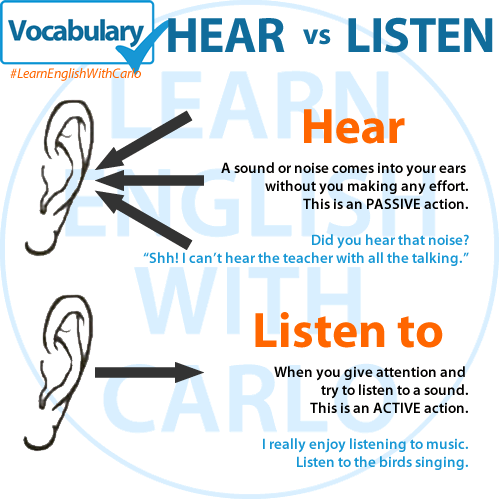One of the most common questions English learners ask is: “What is the difference between ‘hear’ and ‘listen’?” These two verbs may seem similar, but they are used in different ways and convey distinct meanings. Let’s dive into the nuances of these two words to help you use them confidently in your conversations.

Hear
We use hear to describe sounds that come to our ears naturally, without us actively trying to perceive them. Hearing is a passive activity. It happens automatically as long as your ears are functioning and there is sound around you. You don’t need to focus or make an effort to hear; it just happens.
Examples:
- They heard a strange noise in the middle of the night.
(The noise came to their ears unexpectedly.) - Can you hear the birds outside?
- I heard the phone ring while I was in the shower.
In all these examples, the action of hearing is unintentional and requires no effort.
Listen
On the other hand, listen is used when we actively focus our attention on a sound or series of sounds. Listening is intentional and often involves some level of effort or concentration. When you listen, you make a conscious choice to pay attention to the sound.
Examples:
- Last night, I listened to my new Post Malone CD.
(The speaker chose to focus on the music.) - Could you listen to what I’m saying, please?
- She likes to listen to podcasts while commuting.
In these examples, the action of listening is deliberate and purposeful.
Key Difference
To summarize:
- Hear refers to sounds that you perceive without trying. It’s passive.
- Listen refers to actively paying attention to sounds. It’s active.
Practical Use in Conversation
Understanding the difference between “hear” and “listen” is essential for clear communication. Imagine the following exchange between a couple:
Partner 1: “Did you hear what I just said?”
Partner 2: “No, sorry, darling, I wasn’t listening.”
In this example:
- The first speaker uses “hear” to ask if the sound of their words reached the other person’s ears.
- The second speaker apologizes, explaining that they weren’t paying attention (“listening”) to the words, even though they might have heard the sound.
Tips to Practice
Here are some exercises to help you master the difference:
- Identify the Verb: Listen to a recording or watch a short video and decide whether the action described is “hearing” or “listening.”
- Example: A car horn sounds while you’re walking. Are you hearing it or listening to it?
- Make Sentences: Practice creating sentences for each verb.
- Use “hear” for unexpected or passive situations. (I heard thunder during the storm last night.)
- Use “listen” for situations requiring focus. (I listened to my teacher explain the homework instructions.)
- Role Play: Pair up with a friend and act out scenarios where one person “hears” something and the other “listens.”
Final Thoughts
Remember, the key to using “hear” and “listen” correctly is understanding the level of intention involved. If it’s passive and just happens, use “hear.” If it’s active and focused, use “listen.” With practice, these words will soon become second nature in your everyday English.
Do you have a sentence in mind but are unsure which verb to use? Share it in the comments, and we’ll help you figure it out!
